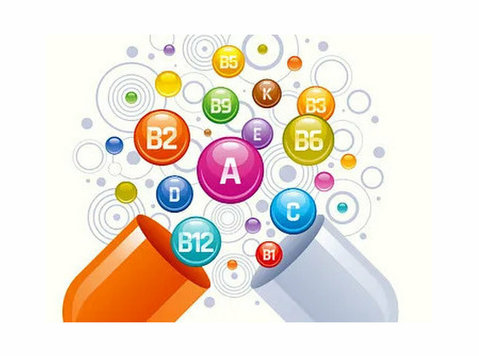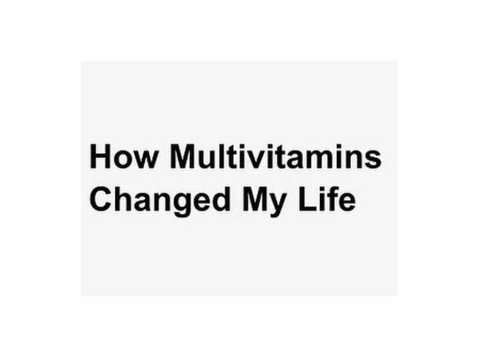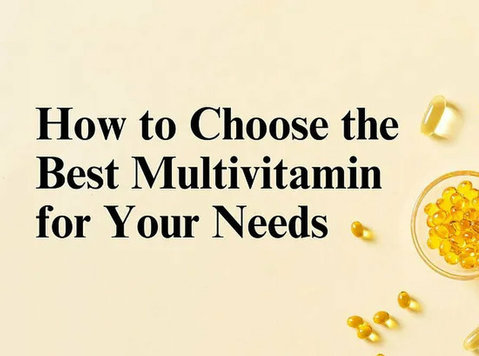Posted in: Buy & Sell > Other in Lucknow | Posted: |
In a world where maintaining a balanced diet can be challenging, multivitamin tablets have emerged as a popular choice for individuals looking to fill the nutritional gaps in their daily intake. But what exactly do these tiny capsules or tablets contain, and how do they contribute to our overall well-being? In this comprehensive guide, we will delve into the world of multivitamins, exploring their ingredients, benefits, and potential drawbacks.
The Multivitamin Basics
Multivitamins are dietary supplements that provide a combination of essential vitamins and minerals. These supplements are designed to complement your diet, ensuring that your body receives all the necessary nutrients to function optimally. But, what are the key components that make up these small but powerful tablets?
1. Vitamins
Multivitamins contain a variety of vitamins, each with its unique role in maintaining good health:
- Vitamin A: Essential for vision, skin health, and immune function.
- Vitamin B-complex: Including B1, B2, B3, B5, B6, B7, B9, and B12, these vitamins are involved in energy production, brain health, and metabolism.
- Vitamin C: Known for its antioxidant properties, it boosts the immune system and aids in collagen production.
- Vitamin D: Crucial for strong bones and overall health, especially when sunlight exposure is limited.
- Vitamin E: An antioxidant that protects cells from damage and supports skin health.
- Vitamin K: Necessary for blood clotting and bone health.
2. Minerals
Apart from vitamins, multivitamin tablets also contain various essential minerals:
- Calcium: Promotes strong bones and teeth.
- Magnesium: Supports muscle and nerve function, as well as bone health.
- Zinc: Boosts the immune system and assists in wound healing.
- Iron: Vital for oxygen transport in the blood.
- Potassium: Regulates blood pressure and muscle contractions.
- Selenium: Acts as an antioxidant and supports thyroid function.
3. Other Nutrients
In addition to vitamins and minerals, multivitamins may include other nutrients like:
- Folate: Crucial for cell division and DNA replication.
- Iodine: Essential for thyroid function and hormone regulation.
- Copper: Required for the formation of red blood cells.
- Chromium: Aids in blood sugar regulation.
The Benefits of Multivitamin Tablets
Multivitamins offer numerous advantages when incorporated into a well-balanced diet and a healthy lifestyle:
- Filling Nutritional Gaps: They help bridge the nutritional deficits that may arise due to dietary restrictions or preferences.
- Boosting Immunity: The vitamins and minerals in multivitamins support a robust immune system, reducing the risk of infections and illnesses.
- Enhancing Energy Levels: B-vitamins in multivitamins are known to boost energy production, reducing fatigue and enhancing vitality.
- Supporting Skin and Hair Health: Vitamins A, C, and E contribute to healthy skin and hair by promoting collagen production and protecting against damage.
- Bone Health: Calcium and vitamin D in multivitamins maintain strong bones, reducing the risk of osteoporosis.
- Antioxidant Protection: Antioxidant vitamins like C and E help combat free radicals, reducing the risk of chronic diseases.
Potential Drawbacks and Considerations
While multivitamins offer numerous benefits, there are a few caveats to consider:
- Dosage: Taking excessive amounts of certain vitamins and minerals can be harmful. It’s crucial to follow the recommended daily allowance (RDA).
- Interaction with Medications: Multivitamins may interact with certain medications, so consult with a healthcare professional if you are on prescription drugs.
- Dietary Supplements: Multivitamins are not a substitute for a healthy diet. They should complement, not replace, your food intake.
- Individual Needs: Nutritional requirements vary from person to person. It’s essential to choose a multivitamin that suits your specific needs.
Conclusion
Multivitamin tablets are a convenient way to ensure you’re getting essential nutrients, especially when dietary gaps are a concern. These supplements typically contain a combination of vital vitamins, minerals, and other nutrients that can promote overall health and well-being. However, it’s essential to choose the right multivitamin, consider individual needs, and consult with a healthcare professional when in doubt. By understanding what multivitamin tablets contain and using them wisely, you can take a significant step towards a healthier, more balanced lifestyle.
Multivitamins
Glatt Life
Softgel
Mystery
Contact this advertiser






